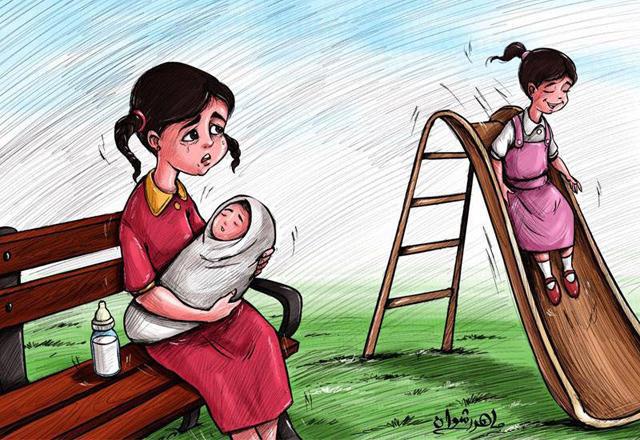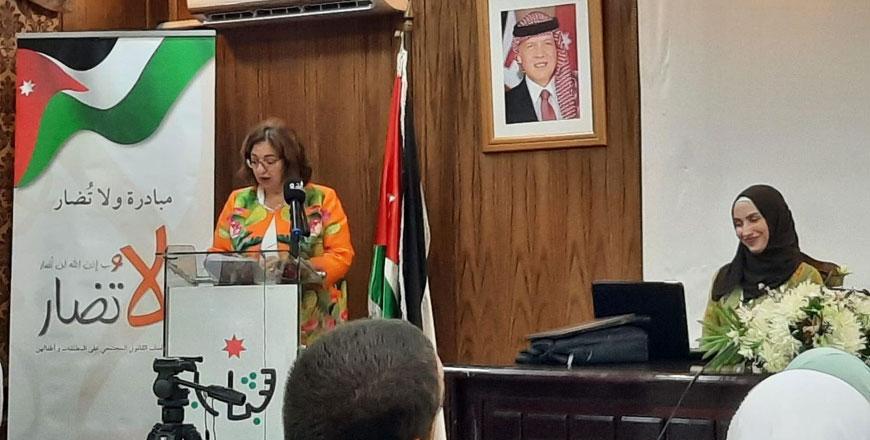You are here
Activists urge amendment to unfair, ‘male-centred’ Civil Status Law
By Sawsan Tabazah - Aug 13,2018 - Last updated at Aug 13,2018
AMMAN — Though labelled by women rights activists as “male-centred”, the Civil Status Law has the whole family’s interest at heart and extensively considers social norms and issues in cases of underage marriages, Judge Ashraf Omari from the Supreme Judge Department argued.
The remark came as a response to legal expert Hala Ahed’s claim last week that the Civil Status Law is “inequitable to women” and “does not meet the modern needs and lifestyles” with its “old-school” legislations stemmed from Fiqh Sources (Islamic studies that derive religious rulings from Quran and Sunna to have deeper look into matters of jurisprudence).
The discussion session, which was held at Abdul Hameed Shoman Foundation and attended by civil society members, students and activists in women’s rights, covered articles in the Civil Status Law that appear to deprive women from certain rights, therefore stripping them from their right to be “first class citizens”. These include complications in marriage, divorce, custody and guardianship issues, according to the discussion organisers
The law, which was build around articles and rules from various Fiqh sources, could have been more just to women if legislators had chosen modern texts from modern scholars that considers women’s needs today not only as mothers but also as breadwinners, Ahed said.
Zaid Ibrahim, a lawyer attending the session, said that legislators chose rules of Fiqh that are 1,000 year-old, stressing “we need a law that suits our new lives.”
However, Omari said that marriage and family affairs are usually governed by religion, not only in Islamic countries but also in Christian nations, noting that having Sharia courts and Christian courts helps Jordan in organising relationships between people through the law to provide a fair judgment for problems facing families.
“The law was not made to achieve the best interest of women or men, but everyone concerned in the issue equally, including children,” Omari told The Jordan Times over the phone.
While women are not allowed to drive, open a bank account or participate in political life before the age of 18, underage girls are allowed to establish a family under the temporal Civil Status Law of 2010, Ahed highlighted, saying “a child is given the authority to take a decision in a marriage as an exception with regards to her social or economical conditions, therefore contradicting with the nationality law that says that a person is legally an adult by the age of 18.”
Denying that the law encourages child marriage, Omari said that such exceptions came to meet the needs of all people with regards to their cultural and social backgrounds as well as economic conditions.
He noted that law should not be required to provide solutions for root problems like poverty or school drop outs, which may cause early marriage.
Sharia courts do their best to combat child marriage by tightening the procedures and studying the cases of each applicant who wishes to get married between the ages of 15 and 18 years old, he said.
However, Ahed stated that “exception proves the rule as over 10,000 child marriage cases are recorded annually”.
“The law does not consider the best interest of a child in custody issues but allows parents to use them as a weapon in the divorce,” she claimed, describing the law as “male-rooted”.
“The law requires divorced women to prove their morality and financial capabilities to take care of their children but a married man does not have to prove that he is a good father,” Ahed underscored.
However, Omari said that such claims are not based on facts as the law considers the mother to be qualified to be the custodian of her children and has the right to receive an alimony from the father during the custody period. He said neither the mother nor the father have to prove anything unless the other party formulated such claims.
For Ahed, the law makes women “second-class citizens” who cannot make decisions about herself or her family’s condition, stressing that civil society organisations and activists’ constant calls for amendments have been faced by resistance.
Meanwhile, Omari highlighted that the law has gone through a number of amendments and can still be developed and improved in accordance with social needs.
Related Articles
AMMAN — The Sisterhood Is Global Institute’s (SIGI) campaign to eradicate child marriage “Nujoud” last week issued a statement calling for “
AMMAN — In light of the high divorce rates in Jordan, an initiative titled “La Todar” (which translates to “do not hurt”) comes forward to p
AMMAN — The Lower House on Tuesday endorsed the 2018 amendments to the Civil Status Law which raised the age at which Sharia judges can gran
















